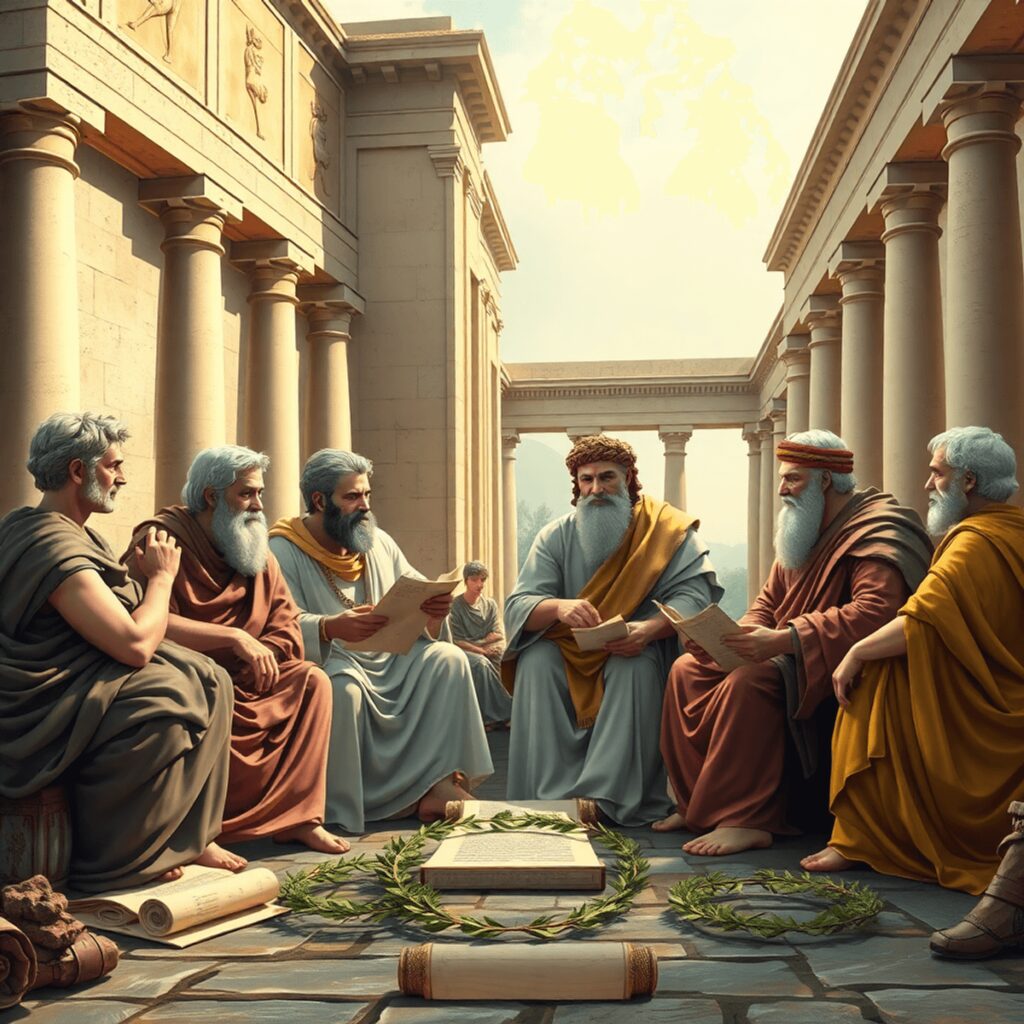Roman philosophy presents a wide range of ideas, with Stoicism often being the most prominent. This school of thought, known for its focus on reason and self-discipline, has received considerable attention throughout history.
In this article, we will explore the various philosophies of Roman thinkers beyond Stoicism. We will examine the teachings and lives of Cynics, Epicureans, Skeptics, Platonists, and Aristotelians. Each philosophical school offers distinct viewpoints that inspire us to reflect on our own beliefs and actions.
However, it’s important to understand that Roman philosophy has had a broader impact beyond just philosophy itself. The Twelve Tables, for example, played a crucial role in shaping Roman law and legal history. These laws were the initial effort to systematize the intricate legal practices of ancient Rome and continue to influence our legal systems today.
Additionally, gaining insight into the power dynamics during the Roman Republic can enhance our understanding of its governance model. This period marked a significant shift from monarchy to a complex political framework that laid the groundwork for contemporary democracies.
Furthermore, agriculture was vital for economic growth in Rome, encompassing more than just food production but also driving economic and social progress.
Moreover, individuals like Scipio Africanus had a profound impact on Roman history. His accomplishments during the Second Punic War not only secured Rome’s supremacy over Carthage but also altered the course of history.
Finally, exploring the rich history and culture of Rome provides us with a comprehensive understanding of how it evolved from a small settlement along the Tiber River into one of history’s most powerful empires. This journey through time is captured in our exploration of ancient Rome.

1. The Cynics: Defying Social Norms
Cynicism emerged as a distinctive philosophical school in ancient Rome, rooted in the earlier teachings of Greek philosophers. This approach challenged societal norms and conventions, advocating for a lifestyle that emphasized self-sufficiency and authenticity.
Key Figures and Contributions
- Diogenes of Sinope stands out as the most notable figure within Cynicism. His life epitomized the core tenets of this philosophy. Diogenes famously lived in a barrel, showcasing his rejection of material excess and societal expectations.
- His provocative actions, such as wandering Athens with a lantern in daylight claiming to search for an honest man, served as powerful social critiques.
Core Beliefs of Cynicism
- Living in accordance with nature: Cynics believed that true happiness comes from living simply and authentically, free from the constraints of societal pressures.
- Rejection of societal conventions: They argued that societal norms often led to corruption and moral decay. By discarding these conventions, individuals could achieve greater self-realization and inner peace.
Implications for Modern Life
Cynicism’s emphasis on questioning societal values remains relevant today. It challenges you to reflect on your own lifestyle choices and motivations. By adopting a more critical perspective on consumerism and social expectations, individuals can cultivate personal authenticity and freedom.
In embracing these principles, you might find inspiration to navigate contemporary life with greater clarity and purpose, echoing the wisdom of ancient Cynics like Diogenes.
Interestingly, the context of ancient Rome during which these philosophical ideas flourished was also marked by a rich tapestry of social events and entertainment. The spectacle of ancient Rome, including gladiators’ fights and chariot races, played a significant role in shaping societal norms and expectations. This entertainment wasn’t merely for amusement; it had profound effects on social relationships and political authority.
Moreover, understanding the daily life in ancient Rome, especially the stark divide between different social classes, provides further insight into the societal structures that cynics like Diogenes were critiquing. The legacy of such philosophical thought continues to influence modern perspectives on consumerism and social expectations, making their teachings all the more relevant today.

2. Epicureanism: The Pursuit of Pleasure and Tranquility
Epicureanism, founded by Epicurus, emphasizes the pursuit of pleasure as the highest good, but with a nuanced understanding. The core principles advocate for a balanced approach to life, where mental tranquility takes precedence over mere physical indulgence.
Key Principles of Epicureanism
- Pleasure vs. Pain: Epicurus distinguished between physical pleasures (like food and drink) and mental pleasures (such as friendship and intellectual pursuits). While physical pleasures can be fleeting, mental pleasures contribute to long-term happiness.
- Examples in Contemporary Life:
- Enjoying a delicious meal can be pleasurable, yet the joy derived from meaningful conversations with friends is often deeper and more fulfilling.
- Engaging in hobbies or learning new skills can provide lasting contentment that outshines temporary sensory experiences.
Friendship and Knowledge
According to Epicureans, true happiness stems from relationships and wisdom. They believed that:
- Friendship serves as a crucial source of support and joy, enhancing one’s life experience.
- Knowledge allows individuals to discern what truly brings satisfaction, guiding them away from unnecessary desires that lead to pain.
Practical Applications
In today’s fast-paced world, applying Epicurean philosophy involves:
- Prioritizing time with loved ones over material pursuits.
- Seeking knowledge through reading or engaging discussions, fostering a sense of fulfillment.
- Cultivating mindfulness to appreciate simple pleasures in daily life without succumbing to societal pressures or distractions.
The essence of Epicureanism invites you to reflect on your values and find contentment through balance rather than excess. This philosophy can also be applied in various aspects of life including immersive experiences like role-playing games, which offer a unique blend of leisure and learning.
Additionally, understanding historical contexts such as Roman Law or exploring incredible Roman engineering feats can provide valuable insights into what constitutes true satisfaction and success beyond mere materialistic pursuits.
Moreover, delving into art and culture in ancient Rome can enrich our understanding of human creativity and expression. Lastly, reflecting on the lives of the patricians, who were masters of luxury and power in ancient Rome, could offer lessons on the responsible use of resources and influence.

3. Skepticism: Questioning Certainty and Dogma
Skepticism is a powerful philosophical approach that promotes critical thinking. It encourages people to challenge accepted beliefs and confront dogmas.
The Origins of Skepticism
Key figures like Pyrrho of Elis played a significant role in establishing Skepticism. Pyrrho advocated for a life free from the limitations of certainty. He argued that achieving peace of mind comes from suspending judgment on various claims or opinions. His viewpoint emphasized that withholding belief can lead to tranquility, allowing individuals to navigate life’s complexities without the weight of unproven assertions.
The Practice of Suspending Judgment
At the core of Skepticism is the practice of suspending judgment. This practice has profound implications for mental well-being:
- Reduces anxiety caused by uncertainty
- Encourages openness to different viewpoints
- Promotes a deeper understanding of complex issues
Real-Life Examples of Skepticism’s Relevance
Real-life examples demonstrate its relevance today. For instance, in discussions about science or religion, adopting a skeptical perspective can foster healthier debates and reduce conflict by encouraging participants to seek common ground instead of asserting rigid beliefs.
The Influence of Skepticism Beyond Philosophy
Skepticism’s impact goes beyond philosophy; it has influenced various fields such as:
- Science: Encouraging methodological approaches that prioritize evidence over assumption
- Religion: Promoting dialogue about faith and doubt without absolute conclusions
- Ethics: Challenging moral dogmas and inviting diverse perspectives on right and wrong
This philosophical exploration into doubt enhances our understanding of knowledge, urging us to engage with the world through curiosity rather than certainty.
The Role of Skepticism in Shaping Political Systems
Interestingly, this spirit of questioning and critical analysis extends beyond personal beliefs or academic discussions. It has also played a significant role in shaping political systems throughout history. A prime example is the transition from monarchy to republicanism in ancient Rome, known as The Birth of the Roman Republic. The overthrow of Tarquin the Proud, the last king of Rome, around 509 BCE marked a crucial shift towards a republican system. This event symbolizes a pivotal moment in history where accepted beliefs about governance were challenged and redefined, further illustrating the profound impact skepticism can have beyond individual lives and into societal structures.

4. Platonism: The Quest for Ideal Forms
Platonism, rooted in the teachings of Plato, significantly influenced Roman thought and philosophy. Central to this school is the concept of ideal forms, which posits that non-material abstract forms represent the most accurate reality. These forms serve as perfect examples of concepts such as beauty, justice, and equality, contrasting with their imperfect manifestations in the physical world.
Key aspects of Platonism include:
- The Role of Reason: For Platonists, reason is paramount in ethical considerations. They argue that rational thought allows individuals to access these ideal forms and develop a deeper understanding of morality and virtue. Engaging with philosophical inquiry fosters clarity in ethical dilemmas, guiding individuals toward just actions.
- Philosophical Inquiry: This approach serves as a vital tool for grasping reality. Through rigorous questioning and exploration, one can unveil deeper truths about existence and ethics. Engaging with philosophical texts and dialogues encourages personal growth by challenging assumptions and expanding perspectives.
Practical implications of Platonism resonate today. Individuals can apply its principles to enhance decision-making processes, cultivate virtues, and strive for a more meaningful life. By embracing philosophical inquiry, one not only navigates personal challenges but also contributes to broader societal discussions on ethics and justice.
The influence of Platonism extends beyond philosophy into various facets of Roman life:
- The Roman Army, a symbol of military power, played a crucial role in the growth and upkeep of the Roman Empire. Its structure, strategies, and operational effectiveness were key in achieving victories across large areas.
- The Roman architecture, characterized by innovative designs that transformed the architectural landscape of their time, served not only functional purposes but also stood as a testament to their power and cultural identity.
- The Roman roads, which acted as the backbone of the empire, were significant in maintaining and expanding its territories.
- Understanding the lives of plebeians, who represented the majority of Rome’s population and significantly influenced its political and economic structures, is essential for grasping the social dynamics of Ancient Rome.
The pursuit of understanding through reason remains a cornerstone of human experience, echoing Plato’s enduring legacy in shaping philosophical thought.

5. Aristotelianism: Virtue Ethics and Eudaimonia
Aristotle is an important figure in the history of philosophy, making significant contributions that influenced many areas of thought. His focus on virtue ethics suggests that being morally good is necessary to achieve the greatest happiness.
Key Ideas
Here are some key ideas from Aristotelian philosophy:
- Eudaimonia: This term is often translated as “flourishing” or “well-being.” According to Aristotle, eudaimonia is the ultimate goal in life. Unlike temporary pleasures, it involves a deeper sense of fulfillment that comes from living a virtuous life.
- Virtue as a Mean: Aristotle believed that virtues are found in between two extremes. For instance, courage is the balance between being reckless and being a coward. This understanding encourages people to develop well-rounded character traits.
The Connection Between Ethics, Politics, and Metaphysics
In Aristotle’s work, ethics, politics, and metaphysics are closely connected. He argued that being ethical is not something separate but rather closely tied to one’s position in society. Politics plays a role in creating an environment that supports virtue and allows for eudaimonia.
Applying Aristotelianism in Everyday Life
In practical terms, Aristotelianism encourages us to reflect on our own character and actions. By engaging with this philosophy, we can strive for personal growth while also considering our responsibilities towards others and our community. Embracing these principles has the potential to lead us towards a more fulfilling and meaningful life grounded in ethical behavior.
The Coexistence of Stoicism with Other Philosophies
Stoicism emerged as a dominant philosophical school in ancient Rome, characterized by its core tenets of rationality, self-control, and acceptance of fate. Central figures such as Seneca and Marcus Aurelius exemplified these principles through their writings and personal practices. Seneca’s letters often emphasize the importance of reason in navigating life’s challenges, while Aurelius’ Meditations reflects a profound commitment to inner peace amidst external chaos.
The interplay between Stoicism and other philosophical traditions enriched its development. Key influences include:
- Cynicism: Encouraged a rejection of societal norms, promoting self-sufficiency that Stoics integrated into their emphasis on virtue.
- Epicureanism: While Stoics advocated for emotional detachment, they recognized the value of mental tranquility found in Epicurean thought.
- Platonism: Stoic ethics echoed Platonic ideals, particularly regarding the pursuit of the good life through reason and virtue.
This synthesis created a robust framework within Roman philosophy. Stoicism not only stood independently but also thrived through the dialogue with other schools, reflecting a dynamic exchange of ideas that shaped its legacy. Exploring the lives of Roman philosophers beyond Stoicism reveals this rich tapestry of thought.
Conclusion
Exploring the lives of Roman philosophers beyond Stoicism reveals a rich tapestry of thought that underscores the diversity within Roman philosophy. Each school, from Cynicism to Aristotelianism, offers unique insights into human existence and ethics, challenging you to reflect on your values and beliefs.
Consider these key aspects:
- Cynicism teaches self-sufficiency and challenges societal norms.
- Epicureanism emphasizes measured pleasure and the importance of friendship.
- Skepticism encourages questioning certainty for peace of mind.
- Platonism explores ideal forms and the value of reason.
- Aristotelianism focuses on virtue ethics and achieving eudaimonia.
Engaging with these ancient teachings can illuminate modern perspectives and inspire personal philosophical exploration. However, to fully appreciate the depth of Roman philosophy, it’s essential to understand its context within the broader framework of the rise and fall of the Roman Empire, which has left an indelible mark on politics, culture, and society.
Moreover, the ancient Roman religion played a significant role in shaping these philosophical thoughts. The religious practices were not merely a set of beliefs but a comprehensive system that intertwined with every aspect of their lives.
Additionally, understanding the legal status of Roman women provides insight into gender dynamics in ancient Rome, which could further enrich your exploration into these ancient teachings. Furthermore, we must acknowledge the enduring influence of the Corpus Juris Civilis on modern law, a significant achievement in the history of law that preserved ancient Roman legal principles while adapting them to contemporary society.
Lastly, it’s worth noting that Roman mythology has had a profound influence on modern culture, reflecting how deeply intertwined these philosophies are with various facets of life. Embrace this journey into Roman philosophy beyond Stoicism, allowing it to enrich your understanding of life and guide you towards fulfillment.
FAQs (Frequently Asked Questions)
What is the significance of Stoicism in Roman philosophy?
Stoicism is one of the most well-known schools of thought in Roman philosophy, emphasizing rationality and self-control. It has significantly influenced Western philosophical thought, yet it is essential to recognize that other philosophical schools also played a crucial role in shaping Roman intellectual life.
Who were the key figures in Cynicism, and what did they advocate?
Diogenes of Sinope is perhaps the most famous Cynic philosopher, advocating for a lifestyle in accordance with nature and rejecting societal conventions. The Cynics emphasized self-sufficiency and often used provocative behavior as social critique, which remains relevant in contemporary discussions about societal norms.
What are the core principles of Epicureanism?
Epicureanism, founded by Epicurus, focuses on the pursuit of pleasure and mental tranquility. It distinguishes between physical and mental pleasures, highlighting the importance of friendship and knowledge in achieving true happiness. This philosophy offers practical applications for finding balance in our fast-paced lives.
How does Skepticism contribute to philosophical discourse?
Skepticism encourages critical thinking by questioning certainty and dogma. Proponents like Pyrrho advocated for suspending judgment to achieve peace of mind. This approach has influenced various fields such as science, religion, and ethics by promoting open-mindedness and inquiry.
What impact did Platonism have on Roman thought?
Platonism, rooted in Plato’s ideas about ideal forms, significantly impacted Roman philosophy. It emphasizes the relevance of reason in ethical considerations and uses philosophical inquiry as a tool for understanding reality. This quest for knowledge has practical implications for personal growth and ethical decision-making.
How do Aristotelian concepts of virtue ethics relate to modern life?
Aristotelianism centers on virtue ethics and the concept of eudaimonia or human flourishing as life’s ultimate goal. Aristotle’s work interconnects politics, ethics, and metaphysics, offering insights into how these areas influence our pursuit of a fulfilling life today.

